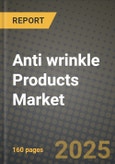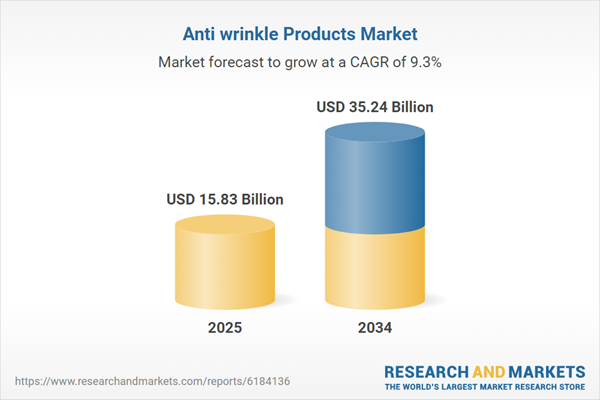Anti wrinkle Products Market
The anti-wrinkle products market includes topical cosmeceuticals (creams, serums, eye treatments, ampoules), dermo-cosmetic lines sold through pharmacies and dermatologists, premium/luxury skincare, devices-enabled formats (roller/microcurrent adjuncts), and nutricosmetic/inside-out offerings positioned to prevent or reduce visible signs of aging such as fine lines, deep wrinkles, uneven texture, photoaging, and loss of firmness. Core consumer groups span women 30+ in urban markets, men’s grooming users, and younger “prejuvenation” buyers who want to delay first wrinkles. Product development is driven by clinically signaled actives - retinoids/retinol esters, peptides and growth-factor mimetics, niacinamide, stabilized vitamin C, AHAs/BHAs, hyaluronic acid and fillers-for-skin concepts, ceramides, and skin-barrier rebuilders - delivered through encapsulation, multi-phase serums, and low-irritancy systems. Macro trends include earlier adoption, “derm-inspired” positioning, stronger claims backed by instrumented tests, and hybridization with sun/blue-light/antipollution protection. The competitive landscape blends multinational beauty houses, dermatology/OTC players, K-beauty/J-beauty innovators, indie/clean brands, and D2C clinics. Differentiation hinges on visible results within 2-4 weeks, low irritation on sensitive skin, texture and fragrance sophistication, and credible storytelling on collagen, elastin, and barrier support. Key challenges are consumer claim fatigue, regulatory scrutiny on anti-aging promises, price compression from masstige entrants, and the need to educate on routine layering and photoprotection for sustained outcomes.Anti wrinkle Products Market Key Insights
- Prevention is growing faster than correction. Younger consumers buy antioxidants, barrier-first serums, and daily SPF to slow photoaging before lines appear; brands that pair anti-wrinkle with environmental defense gain recurring usage.
- Retinoid without the burn. Microencapsulated retinol, granactive/retinol esters, and retinyl-synergy systems target collagen with lower erythema and dryness, opening retinoids to sensitive and male skin.
- Peptides for targeted signaling. Next-gen peptides, copper complexes, and matrixyl-like actives promise wrinkle-depth reduction and firmness when used in multi-week routines; combining with HA or ceramides improves consumer-perceived plumpness.
- Barrier-first formulations. Because many actives irritate, brands are adding ceramides, cholesterol, and soothing botanicals so anti-wrinkle routines are tolerable for daily, year-round use, improving compliance.
- Clinical storytelling matters. Instrumented tests (crow’s feet, nasolabial folds, hydration curves) and dermatologist co-signs help shoppers distinguish real actives from cosmetic-only claims, especially online.
- Texture, scent, and wearability. Lightweight gels, fast-absorbing milky serums, and non-pilling formats are preferred because anti-wrinkle is often one step in a multi-product routine with makeup/sunscreen.
- Men’s and unisex expansion. Low-fragrance, non-greasy, post-shave-friendly anti-wrinkle products with simple 2-3 step regimens broaden the addressable base beyond traditional female users.
- Hybrid care-protection. Day products with SPF, HEV/blue-light shields, antioxidants, and light tone-correction deliver instant payoff and long-term anti-wrinkle benefit in one SKU.
- Channel shift to digital and derm. D2C, social selling, and pharmacy/derm channels favor products with clear ingredients, how-to content, and subscription options to maintain chronic use.
- Clean and sensitive-skin positioning. Fragrance-free, alcohol-free, silicone-light, reef-safe SPF companions, and vegan/low-allergen profiles respond to regulatory and consumer scrutiny without sacrificing efficacy.
Anti wrinkle Products Market Reginal Analysis
North America
Strong demand for derm-inspired, retinol/peptide-based products, often paired with daily SPF and eye care. Consumers expect quick, visible results and clean/inclusive formulations. Retail is omnichannel - specialty beauty, pharmacy, and D2C with heavy influencer/derm education. Men’s anti-aging and hybrid skincare-makeup products are gaining traction.Europe
Pharmacy/dermo-cosmetic brands have high trust, especially for sensitive and mature skin. Regulatory scrutiny drives precise claims, well-documented actives, and fragrance-conscious formulas. Anti-wrinkle often links to anti-pollution and barrier repair, and there is strong interest in sustainable packaging and responsibly sourced ingredients.Asia-Pacific
Younger adoption and “glass/firm skin” ideals drive preventive, lightweight, multi-step routines. K-beauty/J-beauty innovations - encapsulated retinol, peptide ampoules, tone-up/SPF hybrids - set trends. Hot/humid climates favor non-comedogenic, fast-absorbing textures; brightening plus wrinkle-reduction claims are popular. E-commerce and social commerce accelerate new-ingredient uptake.Middle East & Africa
High UV exposure makes photoaging and pigmentation dual priorities; anti-wrinkle is commonly bundled with high-SPF and spot-correction. Consumers prefer non-greasy, heat-stable formats and prestige/luxury positioning. Dermatology clinics and pharmacies are key recommendation channels.South & Central America
Urban pollution, sun exposure, and economic sensitivity shape purchasing - masstige anti-wrinkle lines with vitamin C, niacinamide, and light retinoids perform well. Consumers value brightening plus anti-wrinkle in one product and rely on drugstores, catalogs, and online marketplaces. Localized fragrances and lighter textures drive repeat buys.Anti wrinkle Products Market Segmentation
By Active Ingredient
- Retinoids
- Niacinamide
- Vitamin C
- Hydroxy Acids
- Glycolic Acid
- Citric Acid
- Lactic Acid
- Coenzyme Q10
- Peptides
- Others
By Channel
- Cream
- Oil
- Lotion
- Serum
- Gel
- Others
By Distribution Channel
- Supermarkets/Hypermarkets
- Specialty Stores
- Pharmacies & Drugstores
- Online
Key Market players
L’Oréal Group, The Estée Lauder Companies Inc., Procter & Gamble Co. (Olay), Unilever plc, Shiseido Company Ltd., Beiersdorf AG, Johnson & Johnson Services Inc., Amorepacific Corporation, Coty Inc., Clarins Group, Kao Corporation, Natura &Co, Mary Kay Inc., Oriflame Holding AG, Revlon Inc.Anti wrinkle Products Market Analytics
The report employs rigorous tools, including Porter’s Five Forces, value chain mapping, and scenario-based modelling, to assess supply-demand dynamics. Cross-sector influences from parent, derived, and substitute markets are evaluated to identify risks and opportunities. Trade and pricing analytics provide an up-to-date view of international flows, including leading exporters, importers, and regional price trends.Macroeconomic indicators, policy frameworks such as carbon pricing and energy security strategies, and evolving consumer behaviour are considered in forecasting scenarios. Recent deal flows, partnerships, and technology innovations are incorporated to assess their impact on future market performance.
Anti wrinkle Products Market Competitive Intelligence
The competitive landscape is mapped through proprietary frameworks, profiling leading companies with details on business models, product portfolios, financial performance, and strategic initiatives. Key developments such as mergers & acquisitions, technology collaborations, investment inflows, and regional expansions are analyzed for their competitive impact. The report also identifies emerging players and innovative startups contributing to market disruption.Regional insights highlight the most promising investment destinations, regulatory landscapes, and evolving partnerships across energy and industrial corridors.
Countries Covered
- North America - Anti wrinkle Products market data and outlook to 2034
- United States
- Canada
- Mexico
- Europe - Anti wrinkle Products market data and outlook to 2034
- Germany
- United Kingdom
- France
- Italy
- Spain
- BeNeLux
- Russia
- Sweden
- Asia-Pacific - Anti wrinkle Products market data and outlook to 2034
- China
- Japan
- India
- South Korea
- Australia
- Indonesia
- Malaysia
- Vietnam
- Middle East and Africa - Anti wrinkle Products market data and outlook to 2034
- Saudi Arabia
- South Africa
- Iran
- UAE
- Egypt
- South and Central America - Anti wrinkle Products market data and outlook to 2034
- Brazil
- Argentina
- Chile
- Peru
Research Methodology
This study combines primary inputs from industry experts across the Anti wrinkle Products value chain with secondary data from associations, government publications, trade databases, and company disclosures. Proprietary modeling techniques, including data triangulation, statistical correlation, and scenario planning, are applied to deliver reliable market sizing and forecasting.Key Questions Addressed
- What is the current and forecast market size of the Anti wrinkle Products industry at global, regional, and country levels?
- Which types, applications, and technologies present the highest growth potential?
- How are supply chains adapting to geopolitical and economic shocks?
- What role do policy frameworks, trade flows, and sustainability targets play in shaping demand?
- Who are the leading players, and how are their strategies evolving in the face of global uncertainty?
- Which regional “hotspots” and customer segments will outpace the market, and what go-to-market and partnership models best support entry and expansion?
- Where are the most investable opportunities - across technology roadmaps, sustainability-linked innovation, and M&A - and what is the best segment to invest over the next 3-5 years?
Your Key Takeaways from the Anti wrinkle Products Market Report
- Global Anti wrinkle Products market size and growth projections (CAGR), 2024-2034
- Impact of Russia-Ukraine, Israel-Palestine, and Hamas conflicts on Anti wrinkle Products trade, costs, and supply chains
- Anti wrinkle Products market size, share, and outlook across 5 regions and 27 countries, 2023-2034
- Anti wrinkle Products market size, CAGR, and market share of key products, applications, and end-user verticals, 2023-2034
- Short- and long-term Anti wrinkle Products market trends, drivers, restraints, and opportunities
- Porter’s Five Forces analysis, technological developments, and Anti wrinkle Products supply chain analysis
- Anti wrinkle Products trade analysis, Anti wrinkle Products market price analysis, and Anti wrinkle Products supply/demand dynamics
- Profiles of 5 leading companies - overview, key strategies, financials, and products
- Latest Anti wrinkle Products market news and developments
Additional Support
With the purchase of this report, you will receive:- An updated PDF report and an MS Excel data workbook containing all market tables and figures for easy analysis.
- 7-day post-sale analyst support for clarifications and in-scope supplementary data, ensuring the deliverable aligns precisely with your requirements.
- Complimentary report update to incorporate the latest available data and the impact of recent market developments.
This product will be delivered within 1-3 business days.
Table of Contents
Companies Mentioned
- L’Oréal Group
- The Estée Lauder Companies Inc.
- Procter & Gamble Co. (Olay)
- Unilever PLC
- Shiseido Company Ltd.
- Beiersdorf AG
- Johnson & Johnson Services Inc.
- Amorepacific Corporation
- Coty Inc.
- Clarins Group
- Kao Corporation
- Natura &Co
- Mary Kay Inc.
- Oriflame Holding AG
- Revlon Inc.
Table Information
| Report Attribute | Details |
|---|---|
| No. of Pages | 160 |
| Published | November 2025 |
| Forecast Period | 2025 - 2034 |
| Estimated Market Value ( USD | $ 15.83 Billion |
| Forecasted Market Value ( USD | $ 35.24 Billion |
| Compound Annual Growth Rate | 9.3% |
| Regions Covered | Global |
| No. of Companies Mentioned | 15 |









